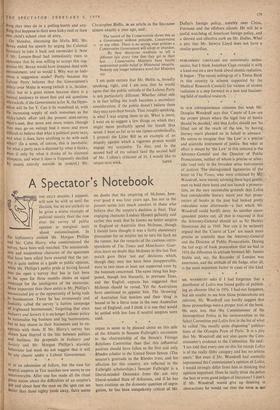IN OUR correspondence columns this week Mr. Douglas Woodruff says
that 'Courts of Law are the proper places where the legal fate of books should be decided,' and that Lolita should not 'be lifted out of the reach of the law, by having literary merit pleaded on its behalf in advance.' He seems to imagine that 'the Law' is a precise and scientific instrument of justice. But what in effect is meant by 'the Law' in this instance is the Attorney-General and the Director of Public Prosecutions, neither of whom is precise or scien- tific (and only in the broadest sense instruments of justice). The 'distinguished Signatories of he letter to The Times, who were criticised by Mr. Woodruff, were merely advising these legal gentle- men to hold their hand and not launch a prosecu- tion, on the very reasonable grounds that Lolita had considerable literary merit and that prose- cutors of books in the past had looked pretty ridiculous soOn afterwards—a fact which Mr. Woodruff could hardly deny. As another corre- spondent points out, all that is required is that the Attorney-General should act as Sir Hartley Shawcross did in 1949. Nor can it be seriously argued that the 'Courts of Law' are much more precise or scientific than the Attorney-General and the Director of Public Prosecutions. During the last orgy of book prosecution that we had in 1954 the difference in attitude between Mr. Justice Stable and, say, the Recorder of London was enormous, and the attitude of the Judge, after all, is the most important factor in cases of this kind.
* * *






































 Previous page
Previous page